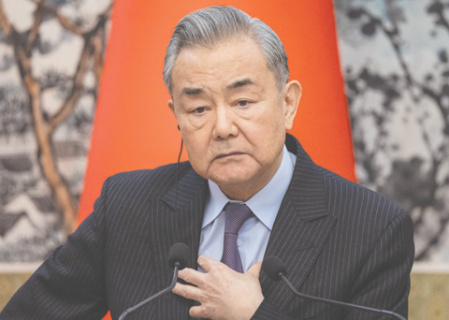
Chinese Foreign Minister Wang Yi held telephone talks with both sides of the conflict, the Foreign Ministers of Iran, Abbas Araqchi, and Israel, Gideon Saar. Western media, citing a statement by the Chinese Foreign Ministry, reported that China supports Iran, which defends its legitimate rights and interests. Wang Yi told his Israeli colleague that China opposes attacking Iran and using force. According to analysts, China, formulating its position on the exchange of blows between Israel and Iran, first of all wants to protect its economic interests. China accounts for up to 90% of Iran’s oil exports. In addition, China has made large investments in Iran’s infrastructure.
The Beijing-based newspaper the Global Times, the voice of Beijing abroad, provides a more extensive interpretation of the course of Tehran and Beijing.
She quoted Araqchi as saying that if Israel attacked Iran’s nuclear facilities, it would not only be a violation of international law, but could also lead to an outbreak of war in the entire Middle East region. Araqchi thanked China for its support and expressed hope that China would play an increasingly important role in ending hostilities.
In other words, Tehran is asking its powerful partner to intervene in the conflict and curb militant Israel. And what does China say about this? According to Wang Yi, China condemns the attacks on Iranian officials, which led to the deaths of civilians, and supports Iran in protecting national sovereignty. The Chinese minister also pointed out that attacks on Iran’s nuclear facilities could have catastrophic consequences. In this regard, Wang called on “countries with influence over Israel” to take concrete steps to restore peace. It is clear which countries Wang had in mind. This is primarily the United States.
Well, what concrete steps is China going to take? According to the Minister, she will maintain communication with the international community in the name of justice. In conclusion, Wang Yi asked Tehran to take care of the safety of Chinese companies and personnel in Iran.
As you can see, China has no desire to get involved in the conflict between Israel and Iran. But can we expect China to take more decisive action, or will it continue to limit itself to verbal interventions? In an interview with NG, Alexander Lukin, scientific director of the Institute of China and Modern Asia of the Russian Academy of Sciences, noted: “China has always called for resolving disputes through negotiations within the framework of the United Nations and other international organizations. Naturally, he condemns Israel. In bilateral conflicts, he supported the Arabs, although in principle China also had good relations with Israel. There was cooperation with Israel in the field of high technology. However, the Arabs are more important because China gets its energy resources from them. And in Iran, China has quite large investments in the energy sector. China buys Iranian oil. Reports that China accounts for 90% of Iran’s oil exports may be close to the truth. After all, Iran is under US sanctions. Therefore, it is difficult for Iran to sell its oil to other countries except China.”
The expert recalled that a Joint Comprehensive Plan of Action was concluded with Iran in 2015. The United States, Russia, China, Great Britain, Germany and France participated in it. In 2018, US President Donald Trump announced his withdrawal from the agreement. He denounced the agreement and imposed sanctions. Iran has since said that it adheres to this agreement together with China and European countries. But recently, the IAEA said that Iran is not complying with its commitment not to enrich uranium above 60%. Which could mean that Iran is manufacturing the necessary components for nuclear bombs. And Iran had their native speakers. “As for China’s support for Iran, I would give this interpretation of China’s course. He supports Tehran because it has not withdrawn from the nuclear deal,” Lukin concluded.
Some Indian media outlets have a completely different assessment of China’s position. The Times of India newspaper writes that Iran has long served as an instrument of Chinese policy in the Middle East. And now China is losing the power that acted under its power of attorney. And now Chinese policy in the Middle East is stalling. It is not only Israel that is to blame for this, but also the United States. China will not put up with such a failure of its course. He will encourage Iran to strike at the United States not directly, but with the help of forces affiliated with Tehran, such as the Yemeni Houthis and the Lebanese Hezbollah. “Let’s not forget that not only Iran, but also these groups have Chinese–made weapons,” The Times of India emphasizes.
